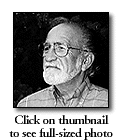Laurent R. Broussal
San Francisco Community College District,
President, San Francisco
Community College Centers, 1980 – 1984
Acting and Interim
President,
San Francisco CCC, 1978 – 1980
Administrative
Director of Student Services, San Francisco CCC, 1974 – 1978
Director, Galileo
CCC,
1972 – 1974
San Francisco Unified School District,
Registrar and Transition Officer,
Adult Division, 1970 – 1972
Registrar, Galileo Adult School,
1965 – 1970
Instructor, Galileo Adult School,
1957 – 1965
Instructor, Daniel
Webster and Louise M. Lombard Schools, 1953 – 1965
Programming to meet community needs.
Excerpt from an interview with:
LAURENT R. BROUSSAL by CUBA Z. MILLER
April 19, 1995
San Francisco, California
MILLER:
Adult education is called on to do many things for many different groups of
people. Can you comment on how you tried to make sure that your program met the
needs of your community?
BROUSSAL:
You mentioned one of the strongest aspects of our programs, I think, and
probably one of the most valuable. People knew of our programs because we had
classes throughout the city. I think I mentioned the mini–courses that were
just general interest courses, but there were also requests for training and
basic education that meant more to these people than any kind of interest
courses because it meant a livelihood to them. It meant that they could
progress from nothing into a secondary class, into college, and on up if they
had the ability. Also, it made available to them the possibility of going into
trade programs, training programs, if they had the basic ed. So wherever basic
education was needed, we put a class. We tried to distribute them into areas
that we were already in, if they were new classes; and if they weren't new
classes, we tried to find areas for classroom space in community–supported
service areas. Then we would also put classes into privately–funded or
privately–supported kinds of service areas. For example, the recreation for the
handicapped, which is out in the western part of the city here, out near
Fleischacker Zoo. They had a good building, and they had clientele there, and
they were taking care of the clientele's needs, in terms of their handicaps,
but they didn't have the instructional staff that was required to move those
people out into the community after they left there. Well, if they came to us
and asked us for an instructor, we would respond. And if it were within the
realm of our expertise and what the state regulated, why, we would go ahead and
do it. And we did that not only for the handicapped, but as I pointed out
already, for the trade areas as well, and for the general community. If the
community came to us, like the Bay View/Hunters Point area, [and] wanted an
instructor in some particular subject area that they felt they needed, and they
had a space for it or we could find a space for it, we'd provide an
instructional program there. And into the jail in San Bruno, we had instructors
there. We had instructors in the hospitals. We had hospital instructors. We had
instructors … where else? At the Army base at the Presidio. And we had an
instructional program for adults on Treasure Island [Naval Base] as well. So
wherever there was a need and we could respond, we responded with whatever
instruction was needed.
MILLER:
You've also provided instructors for a lot of the more organized
community–based organizations.
BROUSSAL:
Yes, we did.
MILLER:
Chinatown Resources.
BROUSSAL:
Yes, Chinatown Resources [Development] Center, the Mission … Mission Hiring
[Hall] or something–or–other. I've forgotten exactly what it was. I can't
remember the title. But yes, we did, we responded with a … Wherever people
would congregate, that wouldn't normally attend school because of whatever
reason –– the adults that is –– we would serve with an instructor. Because we
felt this was our chance to really do the job that we were supposed to be
doing, provided the space and the clientele. Otherwise, these people … And
some of them were illiterate. Some needed the basic education and some needed
courses in mathematics, for example, and other areas English generally. But the
basic ed., really, was where we really were strong, and we went in with these
programs where they were needed.

